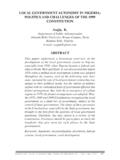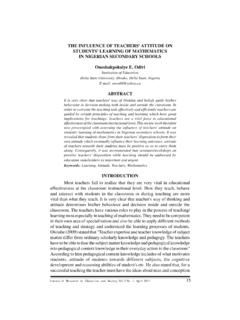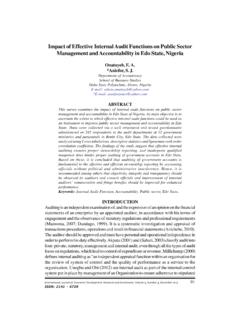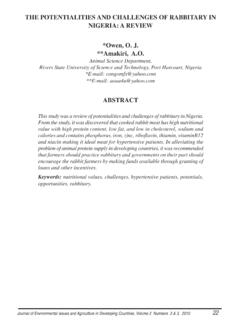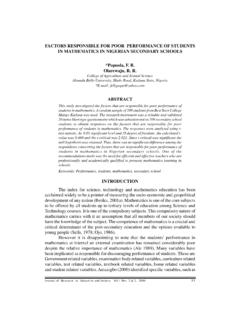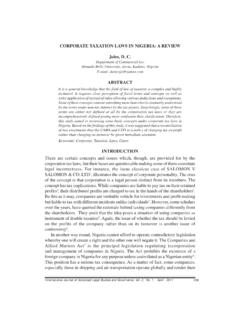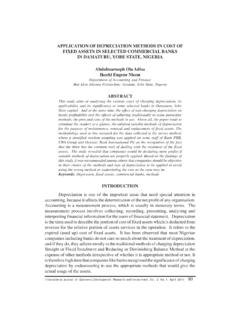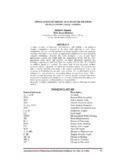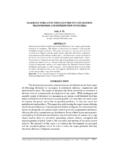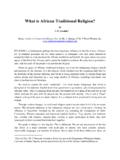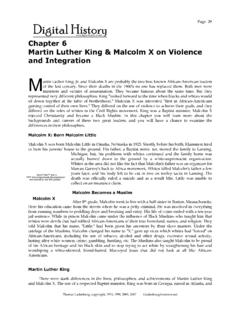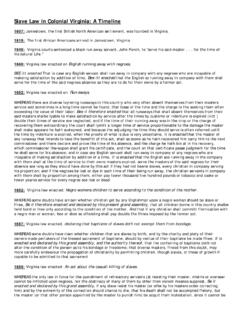Transcription of ROLE OF TRADITIONAL AFRICAN MORAL VALUES IN THE ...
1 Journal of Sociology, Psychology and Anthropology in Practice Vol 3, No. 2 August 20111 ROLE OF TRADITIONAL AFRICAN MORAL VALUES INTHE DEVELOPMENT OF NIGERIAUshe, M. of Arts and Social SciencesNational Open University of Nigeria, Victoria Island, LagosE-mail: ABSTRACTThe sustainable development and self-reliance of any nation are dependent onthe TRADITIONAL MORAL VALUES held in high esteem by the members. This in turn isa direct reflection of the quality of MORAL education of that country. Among themajor constraints to sustainable development of Nigeria is that there is no creativeindigenous MORAL order to sustain the people. The failure of Nigeria to sustainedindigenous MORAL VALUES for the formation of the citizenry, particularly the youngpeople, accounts for the decline of MORAL VALUES in national development. Thisstudy examined the role of TRADITIONAL AFRICAN MORAL VALUES in nationaldevelopment.
2 This study adopted expository research design. It explored theAfrican TRADITIONAL religion and the TRADITIONAL MORAL VALUES in the context ofsustainable national development. Furthermore, it recommended among others,that functional education should be emphasized, particularly for the youths whoare vital for the growth and sustainable development of Nigerian every human society, VALUES are pivot upon which future sustainable national developmenthinges. They are the bedrock and potential sources of national stability and sustainabledevelopment. Through ages and in most countries, VALUES are the underlying fundamentalbeliefs and assumptions that determine behaviours. In Africa as well as the western partsof the world, these beliefs and assumptions often remain unchanged even after there hasbeen a religious conversion. Thus, many AFRICAN societies may have converted to Christianityor Islam but they still cling to TRADITIONAL beliefs and assumptions that determine how theyact morally.
3 It is therefore critical to know and appreciate the role of VALUES in the study ofmoral actions. The failure of European scholars to understand key elements that regulateAfrican morality led them to misinterpret AFRICAN MORAL life. They applied terms such as" MORAL " to AFRICAN beliefs and actions as they were perceived as perversely irrational andghost-ridden. But the European scholars were wrong as expressed by Authur (1965) whowrote on the people of Lower Niger thus:..the Lower Niger's are in the strict sense of the world a truly anddeeply religious people, of whom it can be said, that they eat religiously,drink religiously, bathe religiously and dress Authur said about the Lower Niger, applies to most AFRICAN societies. AFRICAN moralvalues are expressed in art, institutions and oral traditions in the absence of codified westernvalues. They serve as standard VALUES in terms of established norms, rules and traditionalvalues.
4 When such VALUES are accepted by the people and the beliefs about human natureand destiny associated with them assimilate into actions, then there is understanding,Journal of Sociology, Psychology and Anthropology in Practice Vol 3, No. 2 August 20112participation in religious rituals and open dramatizing of the significant elements of permeate and pervade every aspects of human life in the society. They are knit tohuman life than to extricate them. One would need to consider the TRADITIONAL elements thatare involved to avoid distortions. For this reason, it is pertinent that we should examine therole of AFRICAN MORAL VALUES in national development. It is rather unfortunate that the conceptof TRADITIONAL MORAL VALUES and development have been misconstrued and grosslyundermined in Nigerian context as well as Africa. The clarification of these keys conceptswould better our understanding of the issues under term TRADITIONAL MORAL VALUES involves common place terms TRADITIONAL , moralityand VALUES .
5 The word " TRADITIONAL " is part of ordinary linguistic usage. It refers to customs,beliefs or culture of the people of a particular group or community that have been part oftheir life for a long time. Morality is derived from the Latin word "more" which means"manner". According to Joseph and Damian (2005), morality deals with the principles ofhuman behaviours to ascertain whether an act is good or bad, right or wrong and all whatnot, for the well being of man and his harmonious living with the Supernatural (2003) describes morality as the formation of character, manner or custom in away that a distinction between what is right and wrong is known by a person and to Orhungur (2003), MORAL refers to behaving exactly according towhat is considered by the society to be good and acceptable. It also involves action,attitude, virtue and the way of life that makes up a MORAL person. In this context, traits suchas tolerance, love, honesty, kindness, loyalty, fair-play and so forth, are accepted as behaviours such as stealing, money laundering, bribery and corruption, inflatingcontract sum, election rigging, injustice and so on are immoral acts since they are out ofsteps with what is regarded as proper conducts in the (1984) states that value is one of the great concepts whose meaning is multipleand complex.
6 Ushe (2007) in his work, VALUES in Transition, attempts to define value asthe determiners in man that influence his choices in life and thus decide his (1987) informs that out of experiences may certainly generally guide tobehaviour. These guides tend to give direction life and are called VALUES . Rogers (1969)was of the opinion that valuating is the tendency of a person to show preference. Apartfrom these 'utilitarian' definitions, a rather functional one is offered by Idohosa (1998) inhis essay entitled The Study of VALUES . In his view, a value is a selection or an orientationtowards experience, implying deep commitment or repudiation, which influences the orderingof choices between possible alternatives in action. In everyday usage, the word "value"refers to the intrinsic worth, the fair equivalent or goodness of something. Philosophically,value deals with the notion of the good in the widest sense, embracing not only the morallybut also the beautiful and the VALUES are stratified and organized into a fixed hierarchy.
7 Divisions aremade between material VALUES and spiritual VALUES . At the material VALUES are the valuesrelating to the natural order of things and at the spiritual VALUES are those concerned withthe supernatural order. These VALUES guide the daily affairs of people and constrain individualsto live in conformity with the well being of the society. These VALUES are of different types,Journal of Sociology, Psychology and Anthropology in Practice Vol 3, No. 2 August 20113namely: Cultural VALUES , social VALUES , economic VALUES , political VALUES , MORAL VALUES ,among others. In classifying VALUES , the primary concern is the degrees to which each setof VALUES will help man attain his ultimate end in creation. With the beliefs that since man'sultimate goal is unity with the spiritual order of reality, religious VALUES must be consideredsuperior to the natural VALUES . In the context of this paper therefore, the TRADITIONAL valuessimply refer to those beliefs, MORAL codes, and mores that are passed down from generationto generation within a culture, subculture or community and are acceptable by the societyas relating to natural order.
8 TRADITIONAL MORAL VALUES therefore, refer to those indigenousmoral VALUES , which gave the people distinct cultural personalities and are transmittedthrough informal and formal have differences in length, description and degree of to Kukah (2002), the word development refers to a process of improving ormaking to poorer and unindustrialized countries to develop. Edwardo (2006) describesdevelopment as the growth or formation of something over a period of time which is likelyto have an effect on an existing situation. These involve increased skill and capacity, greaterfreedom, creativity, self-discipline, responsibility, material well-being of individuals and thesociety. Development has to do with labour and improvement on the implementation andtechnology employed by labour. The faster way work is done or things are producedconnotes the concept of development. National development in this context is seen as amultidimensional process that normally connotes changes from less desirable to a moredesirable state.
9 National development therefore is a normative concept, which has nosingle accepted definition. Ajani (2003) sees national development as relative to time,space, circumstances and thus cannot be reduced to one universal application TRADITIONAL RELIGIONR eligion is a difficult subject to inquiry including attempts at definition and (2001) observes religion not only because of the problem of objectivity one encountersin defining but is emotion laden, even more so because of the difficulty of penetrating the"inner essence" of religion. Thus, Ajani (2003) list seventeen definitions of religion whichcan be organized into theological, MORAL , philosophical, psychological and sociologicalperspectives. Pratt (1947) describes religion as:The attitude of self focus towards an object in which the self genuinelybelieves what is true; a serious and social attitude of individuals orcommunities towards the power or powers which they conceive ashaving ultimate control over their interests and destinies.
10 This attitudeis mechanical, coldly intellectual, or faint touch of social quality whichwe fed in our relations towards anything that can make response (2001) describes religion as the belief which sets essentially adorations to God inhuman morality. Religion is the law in us, in so far as it attains emphasis from a law giverand judge over us. It is morality, directed to the recognition of God (Downes, 1973). It isin religion that we take up into our lives and allow ourselves to be moved in these one and everything in religion is to face all that moves us in our feelings (Idowu, 1973).Journal of Sociology, Psychology and Anthropology in Practice Vol 3, No. 2 August 20114 Ekpo (1999) posits that religion is the attitude of the mind which covers motivesand beliefs that are expected in acts of worship such a prayer and ritual. Nigosian (1995)defines religion as the feelings, conducts and beliefs which are essential in all adorations inhuman morality.
